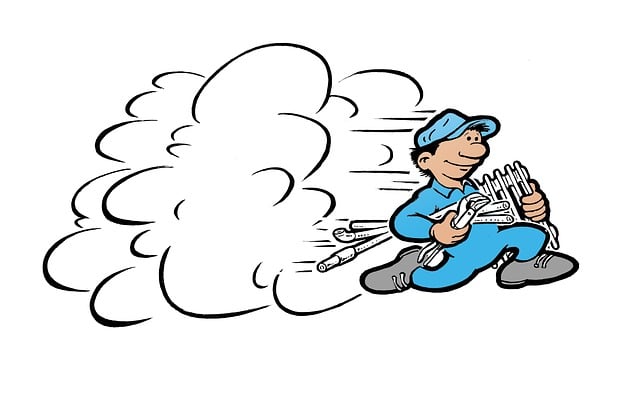Homeowners can prevent costly plumbing issues like clogged drains by understanding debris buildup in pipes, practicing regular cleaning (using drain catchers, eco-friendly cleaners), proper disposal of grease, coffee grounds, and non-biodegradable items, and scheduling professional inspections. Avoiding common culprits like hair, food scraps, and chemical cleaners keeps pipes clear.
“Unravel common plumbing issues plaguing many homes with our comprehensive guide. From clogged drains and leaks to low water pressure, we dissect five recurring nightmares that often could have been easily avoided. Learn about the root causes – from everyday items causing clogs to silent waste-leaks – and discover practical prevention tips. Empower yourself with knowledge on DIY repairs versus when to call a professional, ensuring your plumbing stays in top shape.”
Clogged Drains and Sinks: Unblocking the Common Culprits

Clogged drains and sinks are among the most prevalent common plumbing issues that homeowners face. These blockages can cause significant disruptions, from slow drainage to complete stoppages, leading to frustration and potentially costly repairs. Understanding the root causes is key to prevention. Often, hair, grease, food scraps, and other debris accumulate in pipes over time, forming clogs. Regular cleaning and maintenance, such as using drain catchers and avoiding flushing solid items, can significantly reduce these issues.
Identifying the culprits behind clogged drains involves recognizing what doesn’t belong in your plumbing system. For instance, kitchen sinks often face obstructions from grease buildup, while bathroom drains may be affected by hair and personal care products. Addressing these issues promptly through proper disposal practices and regular drain cleaning can prevent major clogs. Additionally, using eco-friendly, enzymatic cleaners instead of harsh chemicals helps maintain a healthy plumbing system.
– Identifying everyday items causing clogs

Plumbing nightmares often stem from everyday items that, when improperly disposed of or used, can cause severe clogs. The most common culprits include grease, coffee grounds, and food scraps—items that, while seemingly harmless, can accumulate in pipes over time. Greasy foods, in particular, can solidify in cold water, forming a waxy buildup that traps other debris, leading to complete blockages. Coffee grounds, when washed down the drain, can form a paste-like substance that sticks to pipe surfaces, causing slow drains and eventual clogs. Similarly, food scraps, especially those from fatty meals, can congeal and attract other waste, creating a labyrinthine blockage that even the most robust plumbing tools struggle to clear.
Avoiding these common plumbing issues is straightforward. Practice proper disposal methods by using trash cans instead of drains for grease, coffee grounds, and large food particles. Install drain catchers or strainers to trap larger items before they enter pipes, and avoid pouring greasy liquids or cooking oil down the sink. Regularly schedule professional plumbing inspections to address any potential issues early on, preventing costly and time-consuming clogs.
– Prevention tips: what not to pour down the drain

Many common plumbing issues can be avoided by being mindful of what goes down the drain. One of the most important prevention tips is to never pour grease, fat, or oil into the sink or shower. These substances congeal and build up in pipes, leading to clogs that can cause severe damage. Similarly, avoid flushing non-biodegradable items such as wet wipes, sanitary products, or even certain types of food scraps down the toilet, as these can also contribute to blocked drains and sewer line issues.
Additionally, be cautious with chemicals and foreign objects. Never pour chemical cleaners or toxic substances into the drain, as they can corrode pipes and pose a risk to your family’s health. Stick to using eco-friendly, biodegradable cleaning products whenever possible. Furthermore, keep an eye on what goes down the sink; avoid disposing of hair, cotton balls, and other small items that could accumulate and cause clogs in your plumbing system.
In addressing common plumbing issues, such as clogged drains and sinks, prevention is key. By understanding the everyday items that often cause these problems and adopting simple avoidance strategies, like not pouring certain substances down the drain, homeowners can significantly reduce the likelihood of costly and inconvenient clogs. Regular maintenance and awareness can transform these common plumbing nightmares into easily manageable situations.
